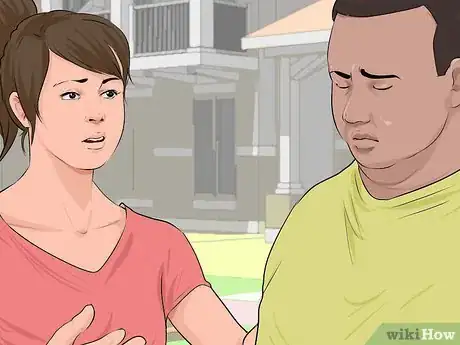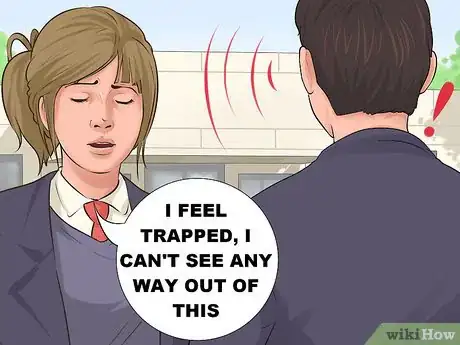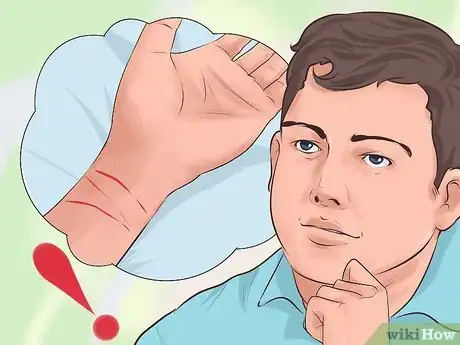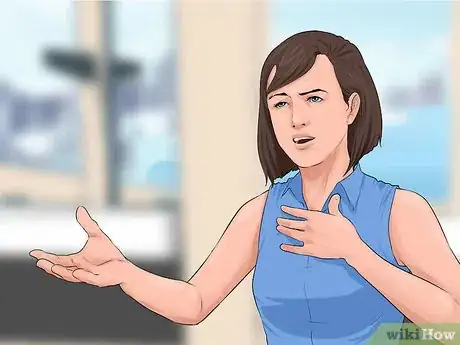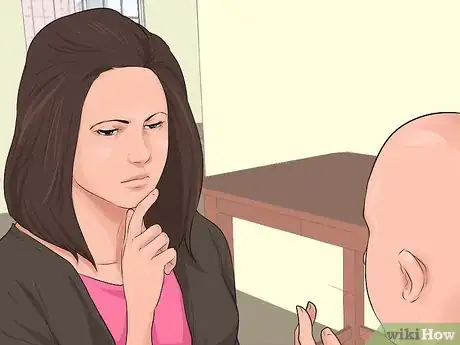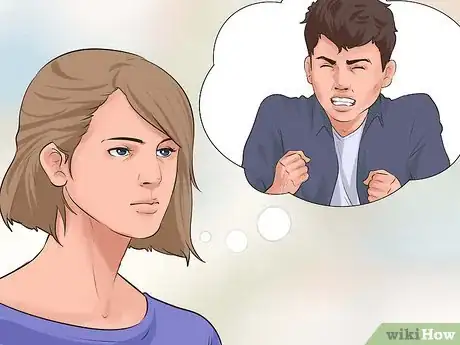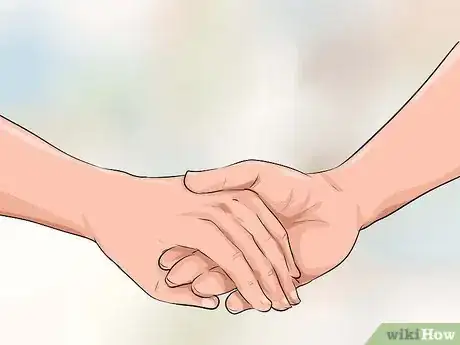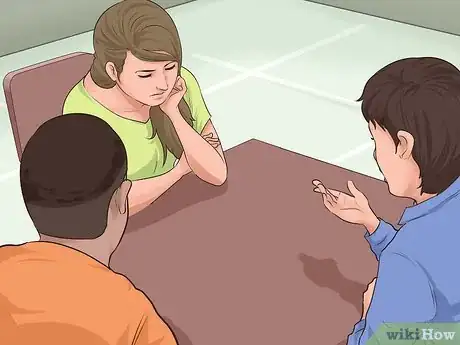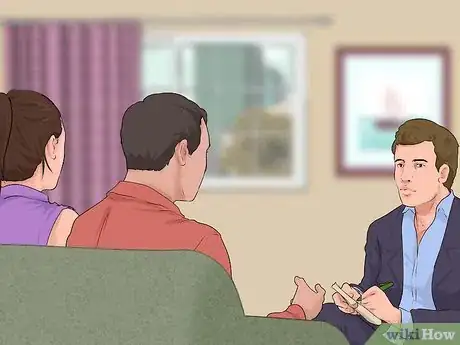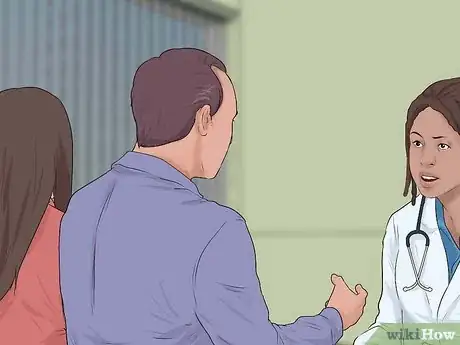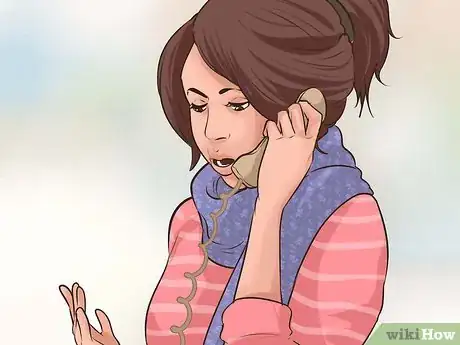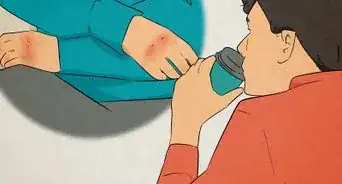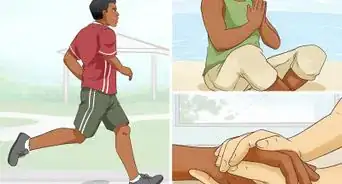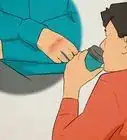This article was co-authored by Klare Heston, LCSW. Klare Heston is a Licensed Independent Clinical Social Worker based in Cleveland, Ohio. With experience in academic counseling and clinical supervision, Klare received her Master of Social Work from the Virginia Commonwealth University in 1983. She also holds a 2-Year Post-Graduate Certificate from the Gestalt Institute of Cleveland, as well as certification in Family Therapy, Supervision, Mediation, and Trauma Recovery and Treatment (EMDR).
This article has been viewed 67,421 times.
Self harm is a serious issue that can take the form of one or more ways of inflicting harm on yourself, such as making surface scrapes on your skin, cutting deeply into your skin, burning yourself with cigarettes, biting yourself, or any way that you are hurting yourself. It can take a toll on your personal, social, and professional life, as well as your relationships. If your significant other finds out you self harm, you may worry about how they will react. You may also not be sure how your relationship can move forward once your significant other finds out. Try talking to your significant other and working through the issue together. If you are struggling to maintain your relationship with your partner because of your self harm habits, you may reach out to others for help.
Steps
Talking to Your Significant Other
-
1Find a quiet, private place to talk. You should try talking to your significant other about your self harm habits face to face, preferably in a quiet, private spot. This may be at your home or the home you share together in a neutral spot, such as the kitchen or the living room. You may also talk to your significant other in a place that you both like to go to together, such as a park near your home or a quiet spot outdoors. Pick a place where both you and your partner will feel comfortable and safe.
- You may say to your significant other, “Can we talk about my self harm? Let's go to a private place and talk.”
-
2Explain why you self harm. Begin the conversation by telling your significant other why you self harm, as best you can. You may not know exactly why or understand the root cause of your behavior. Think about how self harming makes you feel and any possible triggers for your behavior. Use “I” statements when you explain why you self harm to your partner and try to be as honest as you can.[1]
- People self harm for a variety of reasons, such as trauma like physical or sexual abuse or the death of a loved one. Social issues like bullying and psychological issues like an eating disorder can also lead to self harm. You may or may not identify with these reasons as someone who self harms.
- For example, you may tell your significant other, “I self harm because it makes me forget my trauma” or “It may seem strange to you, but self harm makes me feel better, even if it's only for a moment.”
Advertisement -
3Answer any questions your significant other might have. Your significant other will likely have questions about your tendency to self harm. Try to answer their questions as best you can. Being honest with your partner will help them better understand where your behavior is coming from. It will also allow them to feel you can both talk about the issue together.
- They may have questions like, “Why do you self harm? How long have you been doing it? How does it help? How can I help? Why don't you just stop?”
- Use “I” statements and be as honest as you can when answering your significant other's questions. The conversation may be difficult for both of you so take your time and be patient with each other.
- If your significant other asks you a question that you can't answer, it's okay to respond, "I don't know." No one has all of the answers, so don't try to force yourself to give one. It's also ok if you don't feel comfortable answering all of their questions
-
4Respond calmly if your partner gets angry or fearful. Your significant other may be upset when they find out you self harm. They may react with anger or fear, even after you answer their questions about why you self harm. Be calm and patient with your partner. Reassure them that you are aware of the issue and that you appreciate their concern. Tell them that you are being honest with them about your tendency to self harm because you would like their support and understanding.
- For example, you may say to your partner, "I know this news may upset you or make you angry, but I need you to try to understand where I am coming from" or "Please don't pull away from me, I need your support more than ever."
-
5Stay open and honest with your significant other moving forward. At the end of the conversation, you and your partner should feel more trusting and honest with each other. Make a promise to each other to stay open and keep communication going between the both of you. You may end up having many more of these conversations moving forward, especially if you continue to self harm. Try to work as a team on the issue.
- For example, you may tell your significant other, “Moving forward, let's promise to be honest and open with each other. I want us to be able to talk about my tendency to self harm and how if affects our relationship.”
Working Through the Issue with Your Significant Other
-
1Let your significant other know how you are doing day to day. Another way you can act when your partner finds out you self harm is to check in with them on a day to day basis. Try to have a meaningful conversation with your partner at least once a day and let them know how you are doing. If you are having a bad day, be honest about this and let your significant other know. If you are having a good day, tell your partner and celebrate this together.
- For example, you may tell your significant other, “I had a bad day today and I need some support” or “I'm feeling good today and I appreciate your support.”
-
2Try not to hide your self harm from them. Though you may struggle with your tendency to self harm on a day to day basis, try not to keep your habit from your significant other. Often, you feel a sense of shame when you self harm. But hiding it from your partner will only make your relationship more difficult and push your partner away. Being honest about your self harm and talking about it will show your partner that you are not keeping any secrets from them.[2]
- For example, you may say to your significant other, “I self harmed today because I wasn't feeling good” or “I self harmed today because I felt triggered.”
- Don't be surprised if they ask you to pull up your sleeve or pant leg to see if you have done more self harm. Remember that they care about you, so it's normal for them to be worried about your safety.
-
3Accept encouragement and support from your significant other. Part of working through the issue with your partner is accepting their encouragement and support. Your partner may suggest that you talk to a mental health professional or your doctor if your tendency to self harm gets worse or becomes more frequent. They may also encourage you to build your self-esteem and confidence so you can stop self harming. Try to be open to their suggestions and not get defensive or angry at them.[3]
- For example, you may say to your significant other, “Thank you for always encouraging and supporting me. I appreciate you” or “I appreciate your support and encouragement. Thank you for listening and being there for me.”
- If your partner suggests that you stop self harming and you are not ready, tell them that you need more time. Be honest about where you are at and let them know putting pressure on you to stop will not help the situation.
- You may say, “I need more time. Please respect my decision” or “Putting pressure on me will not make this better. Please respect my choice.”
- If you do want to stop self harming but don't think you can, be honest with your partner about it. You could say, "I really want to change this part of myself, but I don't know how to stop." Be ready to accept professional help after you talk to your partner about wanting help.
Reaching Out to Others
-
1Join a support group for those who self harm. If you are looking for support from someone other than your significant other, consider joining a self harm support group. You may join an in person support group in your area that focuses on those who self harm. Or you may join an online support group that you chat with on a daily basis.[4]
- Talking to others in a support group can help you feel less alone and connect you to others who can relate to what you are experiencing. They may also be able to give you advice on how to maintain a romantic relationship when you self harm.
- You can search for support groups online. You can also look up support groups in your area online, through a mental health clinic or through your primary care doctor.
-
2Talk to a counselor or a therapist. You can also reach out to a mental health professional for guidance, such as a counselor or a therapist. Talking to a counselor or a therapist can help you work through your feelings about your significant other and your tendency to self harm.[5]
- You can search for a counselor or a therapist in your area online. Look for a counselor or a therapist who has worked with those who self harm before or has experience working with those who self harm.
-
3Speak to your doctor. Your primary care doctor can also be a good resource to turn to to discuss your tendency to self harm and how it will affect your relationship. Your doctor can also refer you to other mental health care professionals or a support group that can help you cope with your issue.[6]
- Your doctor may also be able to suggest different behaviors or adjustments to your lifestyle that you can try to help reduce your desire to self harm.
-
4Seek immediate assistance for your issue, if necessary. If you are feeling depressed, anxious, or suicidal as a result of your tendency to self harm, don't be afraid to seek out immediate assistance. Search for local resources near you, such as a self harm hotline, a walk in treatment facility, or an emergency call to your therapist.
- You can find resources specifically for people who self harm by looking at TWLOH.com.
References
- ↑ http://www.nhs.uk/conditions/self-injury/Pages/Introduction.aspx
- ↑ http://www.befrienders.org/how-to-support-someone-who-self-harms
- ↑ https://www.psychologytoday.com/blog/healing-trauma-s-wounds/201502/how-help-self-destructive-partner-and-what-not-do
- ↑ http://www.scarleteen.com/article/in_your_own_words/selfinjury_relationships
- ↑ https://www.psychologytoday.com/blog/healing-trauma-s-wounds/201502/how-help-self-destructive-partner-and-what-not-do
- ↑ https://www.psychologytoday.com/blog/healing-trauma-s-wounds/201502/how-help-self-destructive-partner-and-what-not-do
